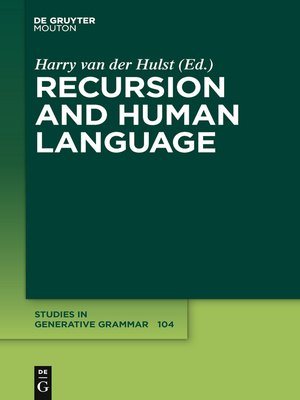
Sign up to save your library
With an OverDrive account, you can save your favorite libraries for at-a-glance information about availability. Find out more about OverDrive accounts.
Find this title in Libby, the library reading app by OverDrive.



Search for a digital library with this title
Title found at these libraries:
| Library Name | Distance |
|---|---|
| Loading... |
The present volume is an edited collection of original contributions which all deal with the issue of recursion in human language(s). All contributions originate as papers that were presented at a conference on the topic of recursion in human language organized by Dan Everett in March 22, 2007. For the purpose of this collection all articles underwent a double-blind peer-review process. The present chapters were written in the course of 2008.
Although the 'recursive' nature of linguistic expressions, i.e. the apparent possibility of producing an infinite number of expressions with finite means, has been noted for a long time, no general agreement seems to exist concerning the empirical status as well as mathematical formalization of this 'characteristic' of human languages or of the grammars that lie behind these utterances that make up these languages.
Renewed interest in this subject was sparked by recent claims that 'recursion' is perhaps the sole uniquely human and as such universal trait of human language (cf. Chomsky, Hauser and Fitch 2000). In this volume, the issue of recursion is tackled from a variety of angles. Some articles cover formal issues regarding the proper characterization or definition of recursion, while others focus on empirical issues by examining the kinds of structure in languages that suggest recursive mechanism in the grammar. Most articles discuss syntactic phenomena, but several involve morphology, the lexicon and phonology. In addition, we find discussions that involve evolutionary notions and language disorders, and the broader cognitive context of recursion.






